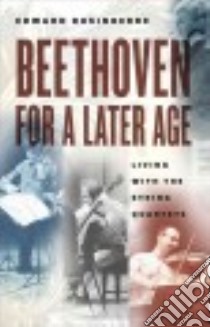Beethoven for a Later Age - 9780226374369
Un libro in lingua di Edward Dusinberre edito da Univ of Chicago Pr, 2016
- € 31.90
- Il prezzo è variabile in funzione del cambio della valuta d’origine
Though many consider Beethoven one of the greatest symphonists of all time, his sixteen string quartet compositions are masterpieces in their own right, among the most extraordinary and challenging pieces of music ever written. Originally composed and performed between 1798 and 1826, they have since inspired musicians such as Stravinsky and Wagner and have been subject to endless reinterpretation. But what is it like to personally take up the challenge of these compositions, not only as a musician, but as a member of a quartet, where each player has ideas about style and expression? To answer this question, Edward Dusinberre, first violinist of the renowned Takács Quartet, offers a rare peek inside the workings of the Quartet, while providing an insightful history of the compositions and their performance.
The Takács, originally founded in Hungary and now based in Boulder, Colorado, is one of the world’s preeminent string quartets, and performances of Beethoven have been at the center of their work together for over forty years. Using the history of both the Takács Quartet and the Beethoven quartets as a foundation, Beethoven for a Later Age provides a backstage look at the daily life of a quartet, vividly showing the necessary creative tension between individual and group and how four people can at the same time forge a lasting artistic connection and enjoy making music together over decades. The key, Dusinberre reveals, to a quartet crafting its own sound is in balancing continuity with change and experimentation—a theme that lies at the heart of Beethoven’s remarkable compositions. In an accessible style, suitable for novices and chamber music enthusiasts alike, Dusinberre illuminates the variety and contradictions of Beethoven's quartets, which were composed against the turbulent backdrop of the Napoleonic Wars and their aftermath, and he brings the technical aspects of the music to life.
Beethoven for a Later Age vividly shows that creative engagement with Beethoven’s radical and brilliant quartets continues to be as stimulating now as it was for its first performers and audiences. Musicians and music-lovers will be intrigued by Dusinberre’s exploration of the close collaboration at the heart of any great performance.
The Takács, originally founded in Hungary and now based in Boulder, Colorado, is one of the world’s preeminent string quartets, and performances of Beethoven have been at the center of their work together for over forty years. Using the history of both the Takács Quartet and the Beethoven quartets as a foundation, Beethoven for a Later Age provides a backstage look at the daily life of a quartet, vividly showing the necessary creative tension between individual and group and how four people can at the same time forge a lasting artistic connection and enjoy making music together over decades. The key, Dusinberre reveals, to a quartet crafting its own sound is in balancing continuity with change and experimentation—a theme that lies at the heart of Beethoven’s remarkable compositions. In an accessible style, suitable for novices and chamber music enthusiasts alike, Dusinberre illuminates the variety and contradictions of Beethoven's quartets, which were composed against the turbulent backdrop of the Napoleonic Wars and their aftermath, and he brings the technical aspects of the music to life.
Beethoven for a Later Age vividly shows that creative engagement with Beethoven’s radical and brilliant quartets continues to be as stimulating now as it was for its first performers and audiences. Musicians and music-lovers will be intrigued by Dusinberre’s exploration of the close collaboration at the heart of any great performance.
Informazioni bibliografiche
- Titolo del Libro in lingua: Beethoven for a Later Age
- Sottotitolo: Living With the String Quartets
- Lingua: English
- Autore: Edward Dusinberre
- Editore: Univ of Chicago Pr
- Collana: Univ of Chicago Pr (Hardcover)
- Data di Pubblicazione: 06 Maggio '16
- Genere: MUSIC
- Argomenti : String quartet String quartets Analysis, appreciation Bowed stringed instrument players Biography
- Pagine: 262
- Dimensioni mm: 228 x 152 x 19
- ISBN-10: 022637436X
- EAN-13: 9780226374369


